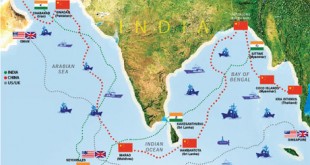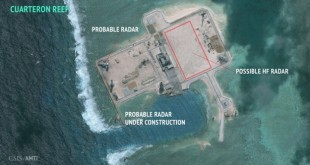Internet has become arguably the most important driver of disruptive innovation in the early twenty-first century, it has transformed the way in which people obtain news, conduct business, communicate with one another, socialize, and interact with public officials. Around 40% of the world population has an internet connection today. However that very powerful engine of global economic growth is now facing multiple threats.
Exponential Rise in Cybercrime and its impact on the global economy
Cybercrime, a major concern for the technology industry, is increasing at a rapid rate and impacting all businesses, regardless of their scale and size. Alliance Global Report estimates, “Cybercrime has already cost approximately $445 billion to the global economy, and 50% of this cost gets absorbed by world’s top 10 economies.”
Rise in state espionage
Edward Snowden leaked documents that showed details about groundbreaking surveillance technology the agency has developed to infect potentially millions of computers worldwide with malware “implants.” The clandestine initiative enables the NSA to break into targeted computers and to siphon out data from foreign Internet and phone networks.
Another grave economic threat is the persistent campaigns by major countries to hack into the networks of innovative and successful companies to steal their most valuable trade secrets and intellectual property.
Rise of Internet Control to ward off threats
Freedom House’s “Freedom on the Net 2014” report finds that internet freedom around the world in decline for the fourth consecutive year, with 36 out of 65 countries assessed in the report experiencing a negative trajectory during the coverage period.
In a departure from the past, when most governments preferred a behind-the-scenes approach to internet control, countries rapidly adopted new laws that legitimize existing repression and effectively criminalize online dissent.
This year in Turkey, Twitter was temporarily blocked in the run-up to local elections, while in Russia the government was criticized for increasing Internet censorship during the Sochi Winter Olympics and for its military conflict with Ukraine. Overall, Iran, Syria and China hold the top spots as the “world’s worst abusers of Internet freedom,” according to the report.
One of the reasons for internet control is internal, Concerned with the power of new technologies to catalyze political change, many authoritarian states have taken various measures to filter, monitor, or otherwise obstruct free speech online. These tactics were particularly evident in countries such as Saudi Arabia, Ethiopia, Uzbekistan, and China, where the authorities imposed further restrictions following the political uprisings in Egypt and Tunisia, in which social media played a key role.
Amnesty International has taken up cases of people persecuted for political use of the internet in countries such as Bahrain, Azerbaijan and Egypt. North Korea has even gone as far as closing down all access to Twitter and Facebook.
Another reason provided by countries, is “technological sovereignty” – or the idea individual countries should have control of their citizens’ data and Internet traffic.
Europe
Rising security threats have pushed some Europe governments to expand their surveillance on governments, individuals, and companies.
French Parliament has overwhelmingly approving a bill that could give the authorities their most intrusive domestic spying abilities ever, with almost no judicial oversight. The provisions, as currently outlined, would allow the intelligence services to tap cellphones, read emails and force Internet companies to comply with requests to allow the government to sift through virtually all of their subscribers’ communications. Among the types of surveillance that the intelligence services would be able to carry out is bulk collection and analysis of metadata similar to that done by the United States’ National Security Agency.
Russia
Russian lawmakers have also campaigned for tighter control over the Internet following the revelations by former US National Security Agency contractor Edward Snowden. President Vladimir Putin, meanwhile, has called for moving key online infrastructure into Russia from overseas, complaining publicly last year that the Internet began as “a CIA project.”
A new law that came into effect last summer obliges all internet companies to store Russian citizens’ data on servers inside the country.
China
China has long had some of the world’s most onerous Internet restrictions. China cut off the ability to receive Gmail on smartphones through third-party email services like Apple Mail or Microsoft Outlook.
Such short-term and long-term disruptions of Gmail connections are part of China’s long-running efforts to protect its technological sovereignty by reducing its citizens’ reliance on American-run communication services.
The recently released cyber security law draft, legalized China’s use of the Great Fire Wall to deny domestic citizens’ access to information the authorities deem as forbidden by laws and regulations
“One unfortunate result of excessive control over email and Internet traffic is the slowing down of legitimate commerce, and that is not something in China’s best interest,” said James Zimmerman, chairman of the American Chamber of Commerce in China. “In order to attract and promote world-class commercial enterprises, the government needs to encourage the use of the Internet as a crucial medium for the sharing of information and ideas to promote economic growth and development.”
US
US government goes further than others and insists that it should have access to data regardless of where it is stored as long as it is handled by US companies.
Protect Internet Freedom says “President Obama is Actively Pushing for More Government Control of the Internet”. “President Obama has called for heavier federal regulation of Internet providers by treating broadband similar to any other public utility. The attempt by the Obama Administration to regulate the Internet as a public utility will take power away from consumers and small business owners, and places it in the hands of Government.
Thailand
Thailand’s military government is taking steps toward achieving their stated desire of gaining greater control of internet use by creating a single gateway for all internet traffic in and out of the kingdom. Officials insist that a single gateway – similar to China’s control over internet traffic via its “Great Firewall” – is necessary to protect national security because it would allow law enforcement authorities to easily track down individuals responsible for online crimes.
The military government’s intention to police internet content by channeling it all through a single point of control has been criticized on many counts.
Arthit, the activist from the Thai Netizen Network, said privacy concerns aside, a single gateway is also a bad idea for Thailand’s thriving digital economy in the modern era. “Once you group all of this traffic into one place, if something goes wrong, the whole system will be broken,” he said. “Once it becomes a single gateway there will be a problem with traffic speeds,” said Anudith Nakornthap, a former information minister under the government of ousted Prime Minister Yingluck Shinawatra.
“The ICT has previously promoted that Thailand will be a hub for digital economy in the region, but this plan doesn’t make sense, because data center businesses need guarantees their services will always be operational, 24 hours a day, 365 days a year.”
Col. Setthapong Malisuwan, defended the plan, saying the “single hub” would allow Thai security forces to monitor internet traffic more easily. Col. Setthapong also insisted that the idea would promote, not hamper, Thailand’s digital economy, and claimed other modern countries have similar surveillance measures.
Internet geopolitics leading to enhanced Cyber warfare
Information is most strategic resource and at presently US is sole Information super power that controls the Internet through its large internet companies and cloud servers. However its position is being challenged by Russia and China
China and US
US allege China to be carrying out widespread efforts to acquire U.S. military technology and classified information and the trade secrets of U.S. companies to help support its long-term military and commercial development. China, however, has continually denied it’s involved in any cyberespionage. In the past, it’s also accused the U.S. of launching cyberattacks, and pointed to leaks from former national security contractor Edward Snowden as evidence.
China and US have recently come into agreement under which China pledged to help crack down on hackers who steal commercial secrets from the United States could reduce U.S.-China tensions and end huge losses for American companies.
Hao Yeli, the former deputy head of the Fourth Department of the People’s Liberation Army General Staff Department — which is responsible for the Chinese military’s offensive electronic warfare — said that the United States had double standards with online surveillance, “America spreads the ideas of democracy widely across the world, but in cyberspace, it’s the opposite,” she said. “The United States continuously maintains a system to monitor the rest of the world but asks other countries to strictly control themselves and remain within bounds. This unsymmetrical line of thinking continues.”
Russia and US
The Moscow’s seizure of the Crimea Peninsula, perceived Russian military support of separatist rebels in eastern Ukraine, Western retaliation by imposing sanctions on Russian interests has resulted in heightened tensions between Washington and Moscow resulting in intensified cyber warfare activities against each other which have been going on since last decade.
Russia has been sponsoring systematic cyber espionage in Europe, the United States and Asia for seven years, Finnish data security firm F-Secure has claimed. Some of the target organizations listed in the report include the former Georgian Information Center on NATO, Georgia’s defence ministry, the foreign ministries of both Turkey and Uganda, and other government institutions and political think tanks in the US, Europe and Central Asia.
Russia-based anti-virus company Kaspersky have detailed the activities of a computer espionage outfit it calls the “Equation Group,” that is actually the NSA’s Tailored Access Operations unit. “The group is unique almost in every aspect of their activities,” Kaspersky concludes. “They use tools that are very complicated and expensive to develop, in order to infect victims, retrieve data, and hide activity in an outstandingly professional way.
The United States is considering sanctions against both Russian and Chinese individuals and companies for cyber-attacks against U.S. commercial targets, several U.S. officials said.
Russia and China
Russia and China are expected to sign a collaborative cyber-security treaty, by agreeing not to conduct cyber-attacks against each other, as well as jointly counteract technology that may “destabilize the internal political and socio-economic atmosphere,” “disturb public order” or “interfere with the internal affairs of the state.”
The latest agreement is the sign that Beijing and Moscow favor changes to global Internet governance that would reduce the traditional role of the U.S. Russia is also preparing an action plan in case the Russian segment of the Internet was shut down from the outside, Russian minister of communications Nikolai Nikiforov said last year.
Rise of Cyber Warfare Armies
The latest manifestation of desire of Internet control is establishment of cyber warfare divisions as well as Cyber Commands, for offensive and defensive operations by many countries including US, Russia, and China.
“One of the most important is the urgent establishment of global norms among the major industrial and developing countries on issues of national security and economic cyberespionage conducted by their intelligence agencies and military services,” writes Dmitri Alperovitch a computer security researcher and co-founder & CTO of CrowdStrike Inc.
Future of the Internet Governance
In wake of the Snowden revelations, States have begun to (re)assert a role in regulating the Internet preferring a larger role for nations and multilateral institutions
At present the decision on future of Internet Governance is in state of flux, it is split between group of countries led by US and Europe who promote “Internet freedom”, and prefer multi-stakeholder status quo, comprised of technical communities, civil society, the private sector, and ultimately, users,
Other group is led by Russia and china who desire “Internet sovereignty” through multilateral framework and expansion of the ITU’s role in Internet public policy issues.
The third group led by India and Brazil who desire to strengthen the multistakeholder model by unbundling it and distributing various roles to different organizations, including the ITU.
Eighty-nine countries have signed WCIT-12 agreement that embraces multi-stakeholder governance but determined that “all governments should have an equal role and responsibility for international Internet governance and for ensuring the stability, security and continuity of the existing Internet . . .”
“We are aware that some people in the world are unhappy with the status quo of Internet governance, but we believe that any change should come in the form of more, not less, decentralized and inclusive participation of people, institutions, firms, experts, private citizens, and governments in multistakeholder institutions,” said Ambassador Daniel A. Sepulveda, Deputy Assistant Secretary and U.S. Coordinator for International Communications and Information Policy.
 International Defense Security & Technology Your trusted Source for News, Research and Analysis
International Defense Security & Technology Your trusted Source for News, Research and Analysis


